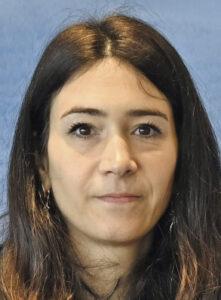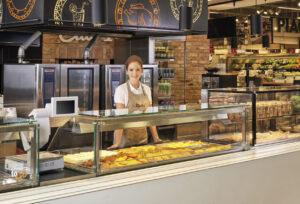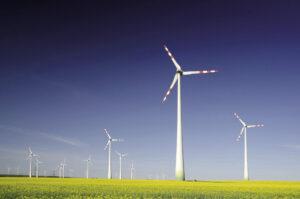Sustainability efforts: reality or illusion?
This article is available for reading in Trade magazin 2024/8-9
WWF regularly carries out public attitude surveys, which show that a considerable but still small proportion of society believes that individual consumer responsibility is the key to change. When it comes to corporate attitudes, it is more difficult to identify specific trends. More and more companies are communicating the importance of sustainability and larger economic actors are required by EU and national legislation to prepare sustainability reports, but it is difficult to tell how much of this is “greenwashing” and to what extent firms see all of this as just an to tick off a list.

Dr. Zoltán Fehér
conservation manager
WWF Magyarország
“We are facing a dual environmental challenge, caused partly by climate change and partly by biodiversity loss and habitat loss. Hungary is no exception: rapid drainage based water management practices have led to severe drought and groundwater depletion in parts of the Great Hungarian Plain”,
points out Dr Zoltán Fehér, conservation manager of WWF Magyarország.
FAO: Sustainable Development Goals until 2030
The Food and Agriculture Organization of the United Nations (FAO) is working to achieve the goals defined in the 2030 Agenda for Sustainable Development in the countries of Europe and Central Asia through four key priorities – food security, improving the resilience of small farmers, food systems transformation, and sustainable natural resource management.

Valeria Rocca
fenntartható fejlődési
célok tanácsadó
FAO
“Practically all current FAO projects in Europe and Central Asia support the achievement of the SDGs”,
informs Valeria Rocca, FAO’s sustainable development goals advisor.

Valentina Gasbarri
communication and
knowledge management
expert
FAO
According to Valentina Gasbarri, FAO’s communication and knowledge management expert the food, energy and financial sectors have recently been hit by a series of shocks. Energy and food prices have soared, while weakening currencies, food supply disruptions and more expensive imports have added to the challenges. Inequalities have increased and many sectors and vulnerable social groups have been affected by these difficulties.
Green Brands: corporate strategies and training
Sustainability is becoming an increasingly important part of corporate strategies and consumer awareness. GREEN BRANDS Hungary and the GB Academy are playing an important role in this domain, with certification schemes and training programmes that support environmentally conscious efforts. The Green Brandstrademark is an independent and transparent certification recognised by the EU.

Hajnalka Kovács-Czövek
country manager
Green Brands Hungary
and GB Academy
“Unfortunately, there is no real certification behind most eco-labels, which can be a breeding ground for greenwashing”,
reminds Hajnalka Kovács-Czövek, country manager of Green Brands Hungary and GB Academy.
The European Union seeks to cut down on greenwashing and stricter regulation is on the way. Hungary is still lagging behind in this area and there is a shortage of professionals as well.
KSZGYSZ: working for a sustainable environment for 32 years
The Hungarian Association of Environmental Enterprises (KSZGYSZ) has been representing the domestic environmental industry for 32 years. KSZGYSZ’s main objective is to assist its 265 member companies in complying with national and EU legislation and meeting the ESG criteria.

Gergely Hankó
managing director
Hungarian Association
of Environmental Enterprises
“Economical resource management and operational efficiency are becoming important and this contributes to the circular economy. The association is helping members in knowledge sharing, innovation promotion, interest representation, training, and awareness raising”,
says Gergely Hankó, managing director of KSZGYSZ.
In October they will organise the international environmental trade fair ENVIRONTEC at HUNGEXPO, which will showcase the Hungarian green industry on the international stage.
FAO food price index remains stable
FAO has reported that the world index of agricultural commodities and foodstuffs remained unchanged in June, as increases in international quotations for vegetable oils, sugar and dairy products offset the drop in cereal prices. The FAO food price index, which tracks monthly price changes for the main foodstuffs in international trade, was 2.5% lower in June than a year earlier and 24.8% below its peak in March 2022. The FAO cereals price index was down 3% compared to May, but the price index for vegetable oils rose by 3.1%. FAO’s sugar price index was up 1.9% after three months of decrease. Dairy prices grew by 1.2% and the FAO meat price index basically didn’t change. //
The big emitters problem
Four hundred companies own the world’s 1,000 largest carbon-emitting industrial facilities, which together emit around 8 gigatonnes of carbon dioxide per year.

If these big emitters were completely decarbonised, one third of the emission reductions needed to meet the Paris Agreement target could be achieved by the end of the decade, according to the latest study by strategic consultancy Roland Berger, titled “The Global Carbon Restructuring Plan”. Roland Berger partner Frigyes Schannen added: the cost of decarbonisation processes can range from USD 75 thousand to 105 thousand billion, depending on the technology used. The cheapest solution is switching to renewables. //
Smaller SPAR toGo footprint

In recent years SPAR toGo food bars have taken important steps towards reducing their environmental footprint. Recently they have cut down on frying oil use by introducing a new type of frying oil, which can be used twice as long. They have also introduced plastic-free packaging and free compostable cutlery made in Hungary. Head of communications Márk Maczelka added that SPAR Magyarország has also optimised energy use in SPAR toGo units. //
CO2 calculator: a tool for reducing emissions
The first results of the K&H CO2 calculator for agriculture, developed by the K&H Group and the Institute of Agricultural Economics (AKI), show that the carbon dioxide emissions of Hungarian agriculture are only one third of the Western European average.

The tool is available online and it allows farmers to calculate their greenhouse gas (GHG) emissions based on real-time data. For instance the first figures show that crop farming emits 2,000 tonnes of CO2. Zoltán Demeter, head of agribusiness at K&H explained: the use of the calculator raises awareness and gives companies the opportunity to showcase their sustainability performance. //
The CSDDD is coming
European Union member states have two years to implement the Corporate Sustainability Due Diligence Directive (CSDDD), which introduces strict sustainability and human rights rules.

The CSDDD will apply mainly to large companies with annual net sales above EUR 450m and more than 1,000 employees. Third-country companies will fall under the scope of the directive if they generate more than EUR 450m annual net sales in the EU. Companies will have to screen their entire operations chain and they will also be required to adopt a climate change mitigation transition plan, in order to ensure that their business model and strategy is compatible with limiting global warming to 1.5°C. //
Related news
Fashion, drones and sustainability – the new face of agriculture at the AgriTech InnoExpo event
🎧 Hallgasd a cikket: Lejátszás Szünet Folytatás Leállítás Nyelv: Auto…
Read more >Related news
The Hungarian Food Book is 50 years old
🎧 Hallgasd a cikket: Lejátszás Szünet Folytatás Leállítás Nyelv: Auto…
Read more >ZEW: Economic expectations worsened in Germany and the euro area in February
🎧 Hallgasd a cikket: Lejátszás Szünet Folytatás Leállítás Nyelv: Auto…
Read more >NKFH: inspections focus on discount prices and customer deception
🎧 Hallgasd a cikket: Lejátszás Szünet Folytatás Leállítás Nyelv: Auto…
Read more >








